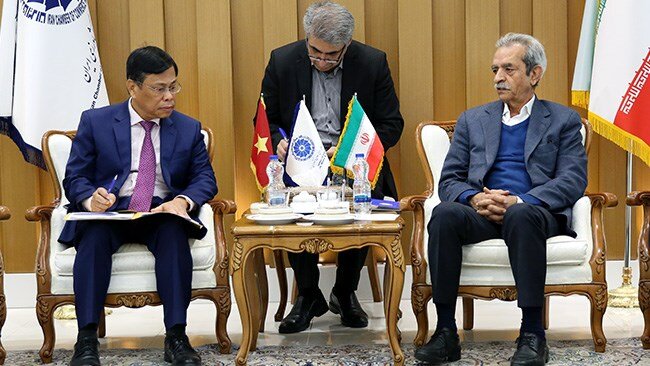Tehran, Hanoi stress developing barter trade to remove banking barriers

TEHRAN – The head of Iran Chamber of Commerce, Industries, Mines and Agriculture (ICCIMA), in a meeting with the Vietnamese ambassador to Tehran on Monday, said developing barter trade between the two countries is going to eliminate the barriers created by lack of banking relations.
According to Gholam-Hossein Shafeie, developing barter trade will lead to a significant increase in the trade exchanges between the two countries, the ICCIMA portal reported.
Referring to Vietnam’s $550 billion trade in 2022, Shafeie said: “Although the economic relations between Iran and Vietnam have a favorable level and the fields of cooperation between the two countries are very diverse, there are also serious problems which have prevented the realization of existing capacities.”
Shafeie underlined banking and monetary problems and transportation issues as the two main obstacles to the development of economic relations between the two countries and added: “Fortunately, barter trade between the two countries, especially in the agricultural sector, has a very high capacity. We need tropical fruits and rice, while Vietnam needs Iranian products such as apples, pomegranates, and other agricultural products. Therefore, it is possible to increase the barter trade interactions between the two countries through serious negotiations and leave the banking problems behind.”
The ICCIMA head further mentioned Vietnam's free trade agreement with Eurasian countries and said: “Iran has also entered this circle and our cooperation in this format can be significant. Vietnam is also one of the active countries in the ASEAN region (Association of Southeast Asian Nations) and Iran is also an active member of ECO (Economic Cooperation Organization). These capacities can be of interest to the two countries in line with the development of multilateral relations.”
Luong Quoc Huy for his part, emphasized his country’s readiness to take the necessary measures to deepen the relations with Iran, saying: “Iran is one of Vietnam's major partners in West Asia and we look at Iran as a gateway to this region. Vietnam is also an important partner for Iran in Southeast Asia.”
In a meeting between the Vietnamese ambassador and Head of Iran’s Trade Promotion Organization (TPO) Alireza Peyman-Pak back on August 30, the two sides had stressed the need to begin official negotiations for signing a preferential trade agreement (PTA) between the two countries.
“An important measure for increasing trade between the two countries is to start negotiations for signing a preferential trade agreement; Such an agreement is underway with Indonesia and we hope that with the necessary follow-ups, it will also be signed and implemented between Iran and Vietnam,” Peyman-Pak said at the meeting.
The TPO head pointed out that his meeting with Luong Quoc Huy could be a prelude to expanding cooperation between Iran and Vietnam, saying: “The value of trade between the two countries is currently $120 million, which is not an acceptable figure and should be increased in the future with the development of cooperation.”
Pointing out that the low volume of trade between the two sides has various reasons that should be identified and resolved, the official added: “Currently, the businessmen of the two countries do not have sufficient knowledge of each other's capacities and effective measures and planning should be done in this regard so that we can improve the space for the development of trade between the two sides.”
The TPO head emphasized that the trade between the two countries should increase at least to two billion dollars and continued: “The first step in this direction is to hold a joint economic committee meeting to activate previously reached agreements because four years have passed since the last meeting of the two countries’ Joint Economic Committee was held.”
It is necessary to hold coordination meetings in this regard as soon as possible, Peyman-Pak stressed.
He pointed to exchanging trade delegations between the two countries as the second step toward improving mutual trade relations and said: “If these exchanges are planned and carried out in a coherent and logical manner, favorable trade agreements will be concluded between the parties.”
Referring to the fact that delegations can be exchanged concurrently with holding various exhibitions in both countries, Peyman-Pak emphasized that an agreement should be signed with corresponding entities in Vietnam to manage such affairs.
The head of Iran’s Trade Promotion Organization further pointed to the establishment of a barter trade mechanism between the two countries as another important measure that could be taken for the development and expansion of mutual commercial cooperation, saying: “There are products in both countries that are needed by the other side, and with a barter trade mechanism, such products can be exchanged easily, leading to more exports for both sides.”
Further in the talks, Luong Quoc Huy, in his turn, welcomed the ideas and suggestions offered by Peyman-Pak and emphasized that the implementation of the mentioned agreements would play a direct role in the development of economic cooperation between the two countries.
He went on to point out that in the first seven months of 2022 and after the end of the Covid-19 pandemic, all business and production fields of Vietnam have returned to normal operation, adding: “The country's economic situation has stabilized and inflation is under control; Currently, Vietnam’s trade balance with other countries stands at $431 billion and the country has a great potential to have economic cooperation with Iran as well.”
The ambassador mentioned Iran as Vietnam’s biggest trade partner in West, South East, and East Asia and considered the Islamic Republic as a gateway for the export of Vietnamese products to Europe.
EF/MA
Photo: ICCIMA Head Gholam-Hossein Shafeie (R) and Vietnam’s Ambassador to Tehran Luong Quoc Huy
Leave a Comment